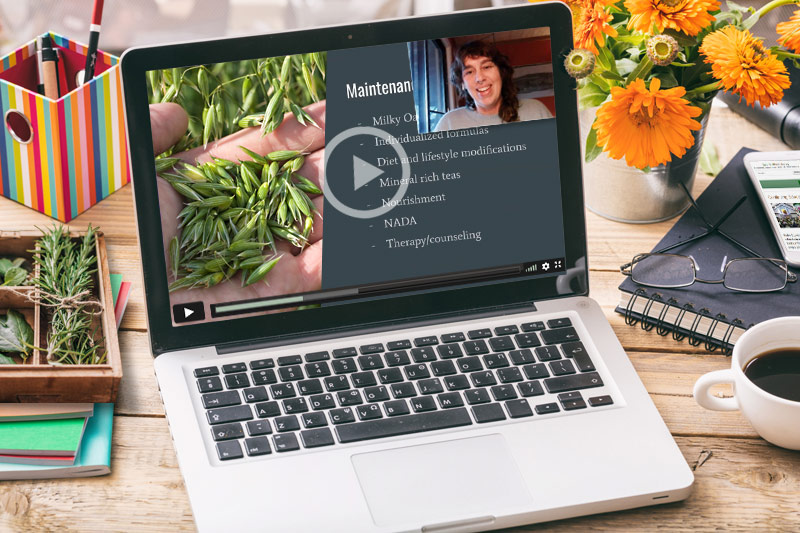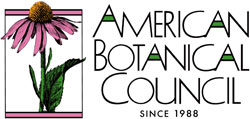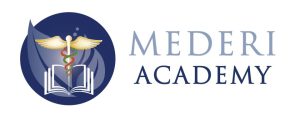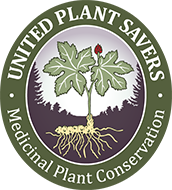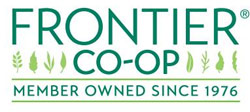A video series for health care providers – with continuing education hours for naturopathic physicians – bundled together in one discounted package:
- Eight (8) video lectures (1.5 hours each)
- Digital book of notes (88-page PDF)
- 12 continuing education credits for naturopathic physicians
- 7.5 pharmacy + 4.5 general (approved by OBNM)
- 9 opioid/addiction + 1.5 pharmacy + 1.5 general hours (approved by SUHS)
- Order with one click for $99 ($160 value)
Note: The information in this series is provided as a research resource for health professionals and is not intended to replace diagnosis and treatment by a qualified health care practitioner. Please check your continuing education records to ensure you have not previously earned credits for these presentations.
Video Series Details
(See below for titles and descriptions of videos)
One click orders all 8 videos plus a 88-page PDF of lecture notes. Together these videos provide comprehensive information on a range of botanical and nutritional therapies for substance use disorder (SUD).
The series opens with Lydia Bartholow, DNP, PMHNP providing an overview of addiction and substance use disorders. In Part A of her two-part presentation, Lydia delves into the neurobiological and cultural underpinnings of addiction. In Part B, she presents botanicals that can be used in conjunction with allopathic medications to manage withdrawal symptoms and cravings.
Next, Kenneth Proefrock, NMD examines botanical and nutritional interventions that can be used to support patients through detox and withdrawal, while also discussing the role that transformative, psychedelic experiences can play in the process.
Following this, Jen Stovall, BSN, RN addresses commonly held myths about drug users and outlines patterns of imbalance associated with long-term use of specific drugs, detailing herbal and nutritional protocols to help.
Then, Lori Harger, PMHNP lectures in a two-part presentation on the epidemiology, clinical language, assessment, and current standards of care for addiction treatment specific to opiates and benzodiazepines. In Part 2, Lori shares holistic treatment strategies including botanical interventions, mind-body skills and collaborative care.
The series concludes with Jen Stovall, BSN, RN presents protocols used in her clinical practice to support clients who want to quit using opioids, explored through a framework of harm reduction to support those experiencing addiction.
As a bonus, we’ve included a hybrid lecture / demonstration from Jennifer Williams, PhD, DACM, LAc that provides ingredients, formulations and procedures for making topical preparations to ease withdrawal pain.
Video presentations offer complete clinical information, with the speaker and the PowerPoint playing together in an ideal format for online learning.
(Series price of $99 includes a 88-page PDF of lecture notes.)
Continuing Education for Naturopathic Physicians: If CME has not previously been earned for the lectures listed below you can earn a total of:
- 12 continuing education credits
- 7.5 pharmacy + 4.5 general (approved by OBNM)
- 9 opioid/addiction + 1.5 pharmacy + 1.5 general hours (approved by SUHS)
- Please check your CE records to ensure you have not claimed these recordings previously.
- Full CE details
Note: This series includes opioid/addiction hours for AZ NDs, but does not meet the approval criteria for the new DEA CME requirements for AZ NDs.
The chart below shows the number of credits available for each lecture in the series. Each lecture is 1.5 hours long, and CE is available for either opioid credit OR pharm credit but not both.
| Presentation Title and Speaker | General Hours (approved by OBNM) | Pharm Hours (approved by OBNM) | Opioid Hours (approved by SUHS) |
|---|---|---|---|
| Addiction Series Part A – Understanding Addiction: Neurobiological and Cultural Underpinnings with Lydia Bartholow, DNP, PMHNP | 1.5 | 1.5 | |
| Addiction Series Part B – Treating Addiction and Promoting Harm Reduction with Botanical Medicine and Some Pharmaceuticals with Lydia Bartholow, DNP, PMHNP | 1.5 | Or 1.5 (for AZ NDs) | |
| Botanical and other Protocols for Opiate Use Disorder with Kenneth Proefrock, NMD | 1.5 | Or 1.5 (for AZ NDs) | |
| The Damage Done: Navigating the Physical Impacts of Long-Term Drug Use with Herbs & Nutrition with Jen Stovall, BSN, RN | 1.5 | ||
| Opiate Use Disorder and its Treatment from a Body-Mind-Spirit Perspective – Part 1 with Lori Harger, PMHNP | 1.5 | Or 1.5 (for AZ NDs) | |
| Opiate Use Disorder and its Treatment from a Body-Mind-Spirit Perspective – Part 2 with Lori Harger, PMHNP | 1.5 | Or 1.5 (for AZ NDs) | |
| Soothing the Hungry Ghost: Supporting our Clients When They are Ready to Quit Using Opioids with Jen Stovall, BSN, RN | 1.5 | Or 1.5 (for AZ NDs) | |
| Topical Botanical Therapies to Ease Substance Withdrawal with Jennifer Williams, PhD, DACM, Lac | 1.5 |
Videos included in this series:
Lydia Bartholow, DNP, PMHNP
Addiction Series Part A – Understanding Addiction: Neurobiological and Cultural Underpinnings
This workshop takes the participant on an overview of most things related to addiction and substance use disorders. We review how trauma makes us neurobiologically vulnerable to developing use disorders, as well as why a trauma informed approach is necessary within the world of addiction. We review the role of stigma in the treatment of addiction, and how it informs public health policy. The common substances of misuse are described (emphasis on opioids), and how finding and addressing the root causes of addiction in the neurobiology of trauma can offer a new approach to treatment. (Catalog Code 20SW12)
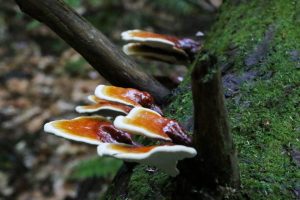
Lydia Bartholow, DNP, PMHNP
Addiction Series Part B – Treating Addiction and Promoting Harm Reduction with Botanical Medicine and Some Pharmaceuticals
This workshop is most effective if you have participated in part A; it covers the core botanical medicines for the management of withdrawal effects, as well as cravings for substances of misuse. We examine real-life scenarios in working with people with substance use disorders in a homeless health care clinic and review the barriers and benefits to utilization of herb therapies for use disorders. This workshop also covers common allopathic medications for opioid and alcohol use disorders and discusses herbs that can be used in conjunction with these pharmaceuticals. (Catalog Code 20SW26)
Kenneth Proefrock, NMD
Botanical and other Protocols for Opiate Use Disorder
Most pertinent to this talk will be the myriad of ways that natural substances can be used to promote a better calibration of the patient’s response to their self-medication. Specific botanical and nutritional interventions include Mitrogyna (Kratom), Sceletium, Alpinia, Zingiber, Verbena, Urtica, Bergamot…amino acids and their derivatives like Tyrosine. DL Phenylalanine, Phenylbutyrate, inositol, phospholipids, nutraceuticals like Piracetam, Aniracetam and Sulfiram and many more. We will discuss the processes of detoxing/withdrawal, receptor blockade, addressing the underlying causes for substance use (physical, psychological, spiritual pain and trauma vs neglect) and the role that transformative, psychedelic experiences can play in the process. (Catalog Code 22SW10)
Jen Stovall, BSN, RN
The Damage Done: Navigating the Physical Impacts of Long-Term Drug Use with Herbs & Nutrition
Long-term use of depressant and stimulant drugs can wreak havoc on the body. This presentation outlines patterns of imbalance associated with specific drugs and preventative strategies for support. Because many drugs impact the body systems in predictable ways resulting in similar symptom patterns, we look at both herbal and nutritional protocols that address the long-term impact of drug use. Material presented is informed by the reality that not everyone is able, willing, or ready to quit using drugs and the belief that they still deserve support. We’ll also consider commonly held myths about drug users and best practices that lead to empowerment rather than stigmatization. (Catalog Code 22ME16)
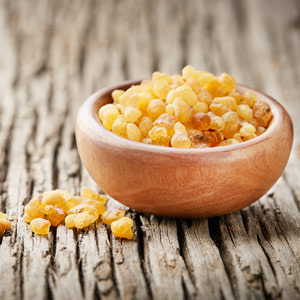
Lori Harger, PMHNP
Opiate Use Disorder and its Treatment from a Body-Mind-Spirit Perspective – Part 1
The first section of the presentation includes an overview of the use of opiates and benzodiazepines. This includes epidemiology, re-thinking clinical language, assessment of substance use, and current standards of care in medications for addiction (MAT) treatment. Explore conventional MAT treatment, pharmacology of methadone, buprenorphine, naltrexone, and short- and long-acting benzodiazepines. Investigate the history of opiate & benzo use, neurological responses to substances, theories of addiction, and trauma-informed care, then dive deeper into screening and assessment tools including motivational interviewing, co-occurring conditions, mental health, pain, and liver/kidney impairment. (Catalog Code 21SW07)
Lori Harger, PMHNP
Opiate Use Disorder and its Treatment from a Body-Mind-Spirit Perspective – Part 2
The second section of the presentation covers holistic treatment strategies for addressing the pain and anxiety that drive the misuse of substances. We address botanical interventions, nutritional therapies, psychotherapeutic interventions, mind-body skills, and collaborative care. We explore the unique role of the practitioner’s healing presence as an agent of change with individuals recovering from addiction. (Catalog Code 21SW08)
Jen Stovall, BSN, RN
Soothing the Hungry Ghost: Supporting our Clients When They are Ready to Quit Using Opioids
Due to widespread opioid use in our culture, herbalists are sure to encounter clients seeking our support to help them quit using. Unfortunately, our cultural narrative around drug use does not allow for a tolerance of, much less identification with, addiction and so herbalists who want to help find there is a lack of practical information about how to provide support. In this class, Jen shares protocols she’s used in her practice to support clients who want to quit using opioids. Using principles of harm reduction as a framework to provide support, we examine conventional concepts of addiction from various angles as we explore alternative ways to support those experiencing addiction. (Catalog Code 23SW16)
Jennifer Williams, PhD, DACM, LAc
Topical Botanical Therapies to Ease Substance Withdrawal
This demonstration includes ingredients, formulations, and procedures for making topical oils, and other preparations using botanicals and other quality ingredients. Participants learn how to make a salve for pain and foot soaks for recovery. We explain why some botanicals are tinctured using alcohol to extract properties and why some properties are extracted through heat or steam. The pharmacological properties of botanicals and their constituents are examined, including: corydalis, notoginseng, carthamus, frankincense, cicada molt, clove, calendula, beeswax, olive oil, coconut oil, menthol, emulsifiers, boric acid, and more. (Catalog Code 20ME36)
Plus Video Series Lecture Notes in PDF Format (88-page digital book) included in the $99 package price.
For general information about other CE offerings, please visit our Naturopathic CE page.



